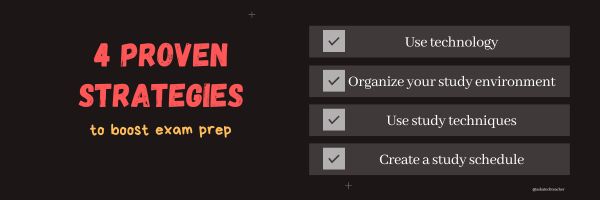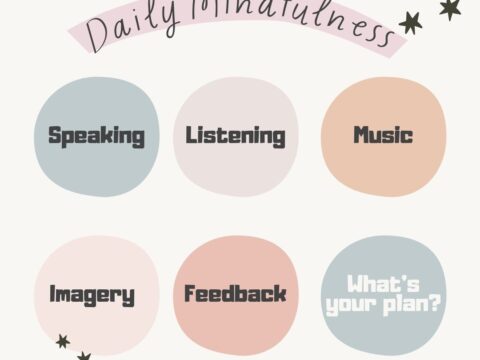Preparing for exams requires a systematic approach to ensure you cover all the necessary material and feel confident on test day. Here are some effective strategies to help you prepare from the Ask a Tech Teacher crew:
The 4 Proven Strategies To Boost Your Exam Preparation
One of the most stressful periods in a person’s life is when exams are looming. Whether it is for the SATs in high school, or for finals in college, when the time comes, you will feel a lot of pressure to do well. This pressure can actually hurt your chances of doing well on the exams. Stress can dramatically affect your thinking process and ability to concentrate.
This means that you have to find a way to eliminate the stress and pressure from the equation so you can study well. Preparation is the best way to not feel stressed and go into the exams with a clear mind. The better prepared you are, the better your chances at success. In this article, we will go over some proven strategies to help you prepare for exams.
1 – Use technology
Pretty much everything is digital these days so we rely on software and technology to even basic tasks. This is good news for exam preparation, however. There are a lot of apps and software programs that can help you study and be prepared in a way that fits best with your schedule and also your learning style.
Using technology can help you pack studying into your schedule to make sure you get the most out of your time. For instance, a mobile application can help you study while you are commuting on the train, or even getting your morning coffee. You can use an extra twenty or thirty minutes to pack in some studying without having to set yourself up ahead of time.
Software and online tools can also help you break down the materials into a better form for you to understand. For instance, NotesEdu gives you practice tests, guided solutions, and detailed explanations to help you grasp complex concepts better. To see how these resources could improve your study sessions, learn more about NotesEdu’s comprehensive test packs on their website.
There are many educational platforms that offer courses so you can expand on your knowledge by using some of them in addition to your other study materials. From basic algebra to advanced quantum physics, you can find resources suitable for all levels. They use interactive videos, quizzes, and peer discussions to make learning engaging and effective.
2 – Organize your study environment
No matter how good the material you will use to prepare is, if you don’t have a study space that allows you to concentrate, it will be for nothing. You need to have a special area where you can be free from distractions and actually set your mind to studying and preparing. It’s not just about having a quiet space. It’s about crafting an area where your mind can thrive.
The first thing to do is minimize distractions. This could mean different things for different people. Some might prefer absolute silence, while others work best with a little background noise.
Find out what works best for you and stick to it. For instance, if you need to work in a library but the noise from the door opening, or people shuffling in their seats will be distracting, put on some noise canceling headphones.
The space you use should also be free from clutter. A cluttered workspace can lead to a cluttered mind. Keep your study space clean and organized. Have a specific place for your books, notes, stationery, and other study materials. This not only keeps your space visually pleasing but also saves time spent looking for lost or misplaced items.
Finally, personalize your study space. This could mean adding a plant, some motivational quotes, or photos that inspire you. The goal is to make the space yours, somewhere you enjoy spending time.
3 – Use study techniques
Everybody learns in their own way. This is why it’s important to find the best technique to help you absorb information. There are different techniques to try out that will help you find your own best strategy for studying.
For instance, many people like to use flash cards so they can memorize bite sized chunks of information. Reading a long text is difficult to digest and understand. When you can condense complex ideas down to something easier to remember, you are more likely to hold onto that information.
Another very helpful technique is to use spaced repetition. This technique involves reviewing information at increasing intervals over time. It’s proven to help cement knowledge in long-term memory. You can incorporate this technique by scheduling reviews of your notes days or even weeks after you initially studied the material.
4 – Create a study schedule
Designing a solid study schedule is like having a roadmap to success. It helps guide your learning process, ensuring you allocate enough time to each subject and stay on track.
Before you can plan, you need to know what time you have available. Jot down all your commitments for the week, from school hours to extracurricular activities. This will give you a realistic picture of the time you can dedicate to studying.
Once you have the schedule mapped out, try to fit your studying into it. This involves prioritizing your subjects. Not all subjects require equal attention. Some might be more challenging or carry more weight in your final grade. Prioritize these by allocating more study time to them. Others that are easier to study or have less impact on your final grade should be set on the back burner.
Finally, breaking your schedule down into blocks of time can really help. Instead of studying for hours on end, break your study time into manageable chunks. Shorter, focused study sessions with breaks in between can help your understanding and retention of information.
Conclusion
Everybody has their own way of preparing for exams, but some of them are not really getting the most out of their time. With the techniques and strategies listed above, you can take all of the stress and anxiety away from the process and go into the exams confident in your ability to do well.
Here’s the sign-up link if the image above doesn’t work:
https://forms.aweber.com/form/07/1910174607.htm
Jacqui Murray has been teaching K-18 technology for 30 years. She is the editor/author of over a hundred tech ed resources including a K-12 technology curriculum, K-8 keyboard curriculum, K-8 Digital Citizenship curriculum. She is an adjunct professor in tech ed, Master Teacher, webmaster for four blogs, an Amazon Vine Voice, CSTA presentation reviewer, freelance journalist on tech ed topics, contributor to NEA Today, and author of the tech thrillers, To Hunt a Sub and Twenty-four Days. You can find her resources at Structured Learning.





































